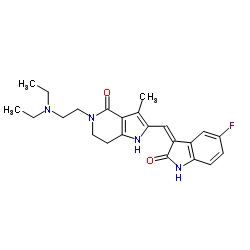1044040-56-3
| Name | FAMITINIB |
|---|---|
| Synonyms |
768FW21J3L
5-[2-(Diethylamino)ethyl]-2-[(Z)-(5-fluoro-2-oxo-1,2-dihydro-3H-indol-3-ylidene)methyl]-3-methyl-1,5,6,7-tetrahydro-4H-pyrrolo[3,2-c]pyridin-4-one FAMITINIB Famitinib (SHR1020) |
| Description | Famitinib (SHR1020), an orally active multi-targeted kinase inhibitor, inhibits the activity of c-kit, VEGFR-2 and PDGFRβ with IC50 values of 2.3 nM, 4.7 nM and 6.6 nM, respectively[1]. Famitinib exerts powerful antitumor activity in human gastric cancer cells and xenografts.Famitinib triggers apoptosis[2]. |
|---|---|
| Related Catalog | |
| Target |
VEGFR-2:4.2 nM (IC50) PDGFRβ:6.6 nM (IC50) c-kit:2.3 nM (IC50) |
| In Vitro | "Famitinib inhibits the VEGF-induced proliferation, migration and tubule formation of human umbilical vein endothelial cells, and micro-vessel spouting from matrigel-embedded rat aortic rings[1]. Famitinib inhibits cell proliferation by inducing cell cycle arrest at the G2/M phase and causes cell apoptosis in a dose-dependent manner in gastric cancer cell lines. Famitinib (0.6-20.0 µM) inhibits gastric cancer cell growth in a dose-dependent manner[2]." Cell Proliferation Assay[3] Cell Line: Human gastric cancer cells BGC-823 and MGC-803 Concentration: 0, 0.6, 1.25, 2.5, 5.0, 10.0 and 20.0 µM Incubation Time: 24, 48 and 72 hours Result: Inhibited cell growth in a dose-dependent manner. The IC50 values in BGC-823 and MGC-803 cells were 3.6 and 3.1 µM, respectively. |
| In Vivo | "Famitinib exhibits broad and potent anti-tumor activity, leading to regression or growth arrest of various established xenografts derived from human tumor cell lines [1]. Famitinib significantly slows tumor growth in vivo via inhibition of angiogenesis in BGC-823 xenograft models. Famitinib (50 and 100 mg/kg;gavage) reduces xenograft growth in vivo via inhibition of angiogenesis[2]." Animal Model: 18-20 g female BALB/c athymic nu/nu mice (age, 6–8 weeks) bearing BGC-823 xenografts[4] Dosage: 50 and 100 mg/kg Administration: Gavage, once daily for 3 weeks Result: Both doses exerted a similar inhibitory power, but greater toxicity was observed. Inhibited BGC-823 xenograft growth (tumor volume, 395.2 vs. 2,690.5 mm3), and animal weights were similar between groups (21.6 vs. 18.7 g). |
| References |
| Density | 1.3±0.1 g/cm3 |
|---|---|
| Boiling Point | 677.1±55.0 °C at 760 mmHg |
| Molecular Formula | C23H27FN4O2 |
| Molecular Weight | 410.48 |
| Flash Point | 363.3±31.5 °C |
| Exact Mass | 410.211792 |
| LogP | 2.61 |
| Vapour Pressure | 0.0±2.1 mmHg at 25°C |
| Index of Refraction | 1.628 |
